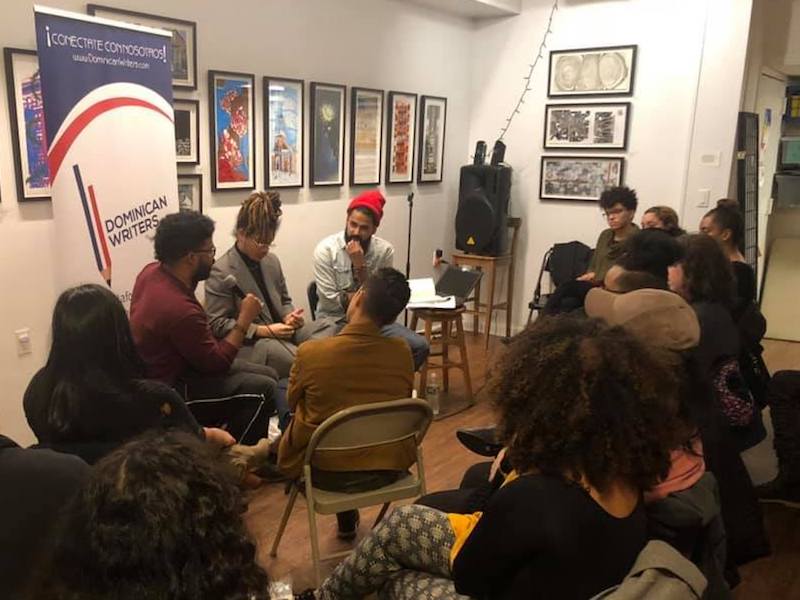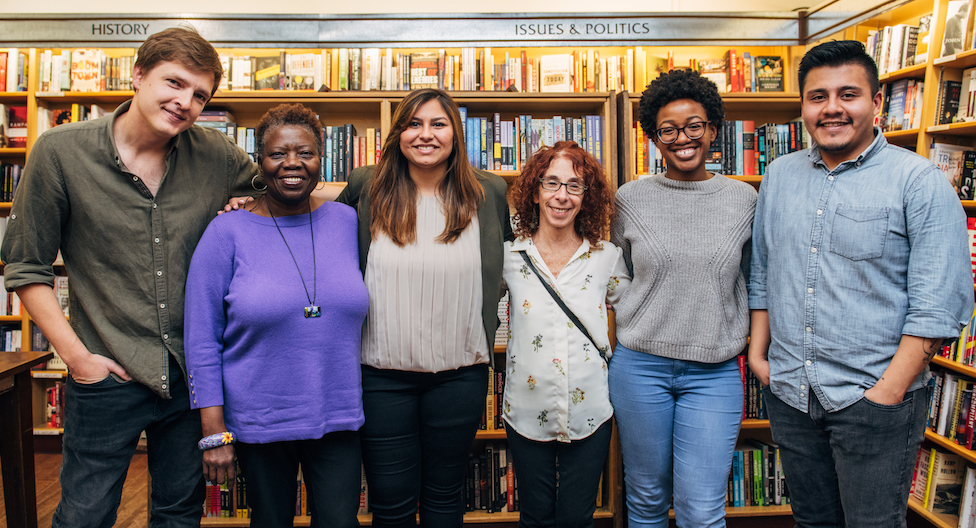Dominican Writers Association Presents Julian Randall and Gabriel Ramirez
Mariela Regalado is a relambia who loves to tell stories, specifically about her experiences as a Dominican American growing up between New York and Santiago, Dominican Republic. As director of college counseling at Brooklyn’s Juan Morel Campos Secondary School, she was named Hometown Hero in Education by the Daily News for her work with students in Brooklyn and the Bronx. Her writing has appeared in Remezcla, Fierce, La Galería Magazine, Harvard Latinx Law Review, St. Sucia, the Manhattan Times, and the Bronx Free Press.
 On December 20 the Dominican Writers Association, with support from Poets & Writers’ Readings & Workshops program, hosted a crucial conversation centered on the idea that there are missing voices from the literary canon that deserve to be amplified. The decision to host the event at Word Up Community Bookshop, a multilingual, nonprofit community bookstore run by volunteers in the Washington Heights neighborhood of New York City, was an easy one as they share many of the same values as the Dominican Writers Association, an organization created and run by writers of Dominican heritage in New York City that aims to support and foster the development of creative writers.
On December 20 the Dominican Writers Association, with support from Poets & Writers’ Readings & Workshops program, hosted a crucial conversation centered on the idea that there are missing voices from the literary canon that deserve to be amplified. The decision to host the event at Word Up Community Bookshop, a multilingual, nonprofit community bookstore run by volunteers in the Washington Heights neighborhood of New York City, was an easy one as they share many of the same values as the Dominican Writers Association, an organization created and run by writers of Dominican heritage in New York City that aims to support and foster the development of creative writers.
Writer and teacher JP Infante, who hosts a regular series at Word Up, led the conversation between poets Julian Randall and Gabriel Ramirez. The chairs were set up in a semicircle and the two guests sat in the center. Infante opened the conversation by introducing Julian Randall, a living queer Afro-Dominican poet from Chicago and MFA candidate in poetry at the University of Mississippi.
 Randall’s debut poetry collection, Refuse (University of Pittsburgh Press, 2018), won the 2017 Cave Canem Poetry Prize. While browsing the shelves of new and used books before the event, I spoke briefly to Randall, who was wearing a burgundy T-shirt with white bold letters that spelled out the word REPARATIONS. I asked what reparations meant to him and he replied: “It means to me, a redress of grievances, a possibility for a new beginning.... There are certain ways in which we’ve been deprived; even of the ability to begin narratives where we would like to begin them. It means the ability to revise history.”
Randall’s debut poetry collection, Refuse (University of Pittsburgh Press, 2018), won the 2017 Cave Canem Poetry Prize. While browsing the shelves of new and used books before the event, I spoke briefly to Randall, who was wearing a burgundy T-shirt with white bold letters that spelled out the word REPARATIONS. I asked what reparations meant to him and he replied: “It means to me, a redress of grievances, a possibility for a new beginning.... There are certain ways in which we’ve been deprived; even of the ability to begin narratives where we would like to begin them. It means the ability to revise history.”
Gabriel Ramirez is a queer Afro-Latinx poet, activist, youth mentor at Urban Word NYC, and MFA candidate in poetry at the University of Mississippi. The first question of the night was: “What is a poet? What is the function of a poet?” Ramirez replied: “What isn’t a poet? What is it to be a breathing archive?” Ramirez’s work is moving and inspiring with intergenerational moments weaved carefully into his writing. His outfit that evening, a black-and-white checkered suit belonging to his late grandfather adorned with gold accessories that were made in the Dominican Republic, also paid homage to his roots.
The intimate conversation between these poets was shared with a kind audience who embraced them like family. There was a shared connection and a feeling of being seen, validated through the words of poets and writers who demonstrated through their stories and pieces that we are not alone.
Attendees were able to chime in during the conversation and asked for clarification in the answers given by Randall and Ramirez, and some were even comfortable enough to share their own anecdotes. I was filled with solid encouragement that there is a space for Latinx writers. To close the event, both Randall and Ramirez delighted us with a reading of their respective works, bringing to life the challenges and struggles they have both experienced as queer Latinx writers.
Support for the Readings & Workshops Program in New York City is provided, in part, by public funds from the New York State Council on the Arts, and the New York City Department of Cultural Affairs, with additional support from the Frances Abbey Endowment, the Cowles Charitable Trust, and the Friends of Poets & Writers.
Photos: (top) Mariela Regalado (Credit: NYC Toledo). (bottom) Julian Randall and Gabriel Ramirez with JP Infante (Credit: NYC Toledo).




